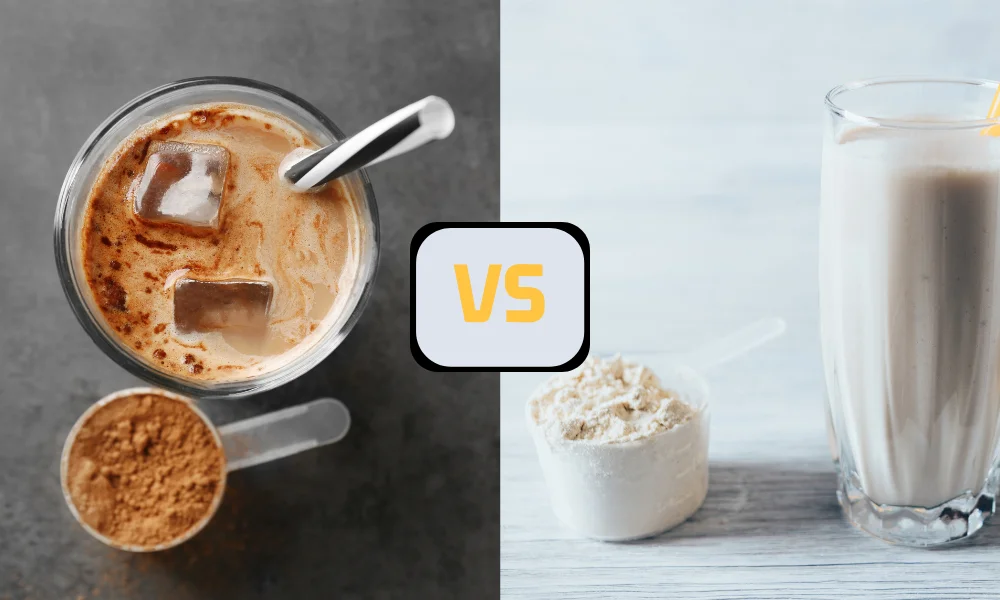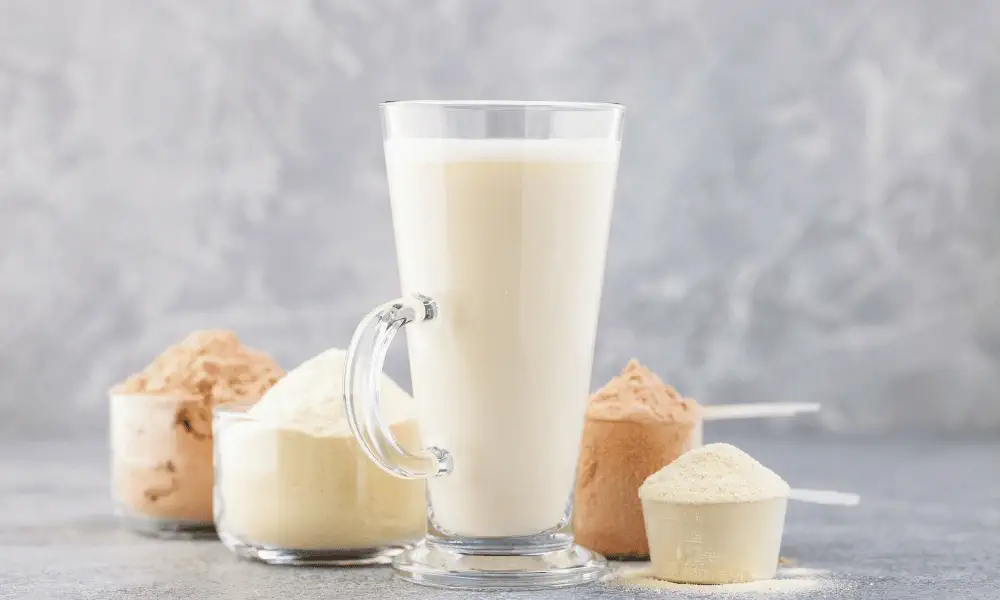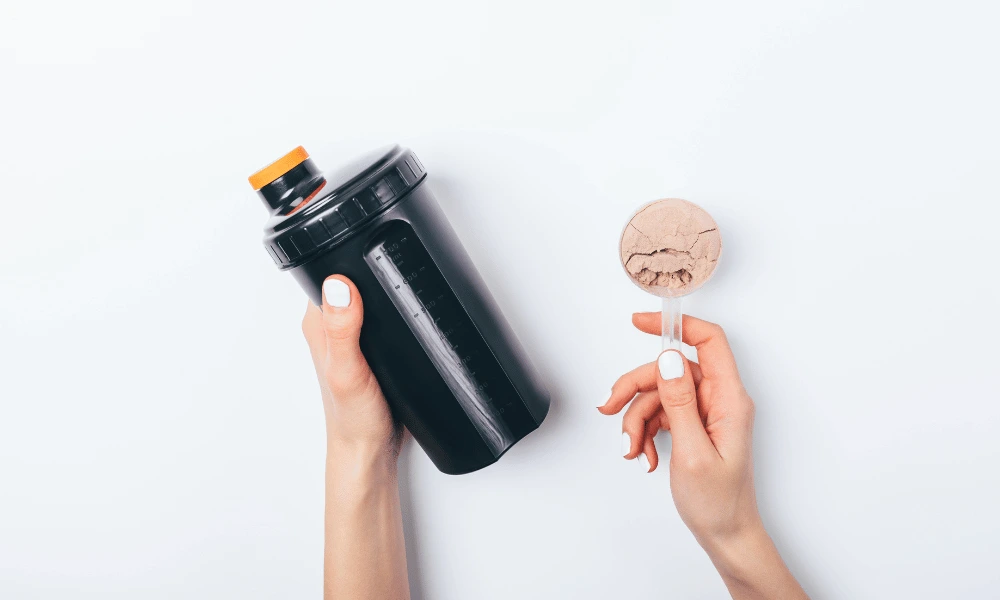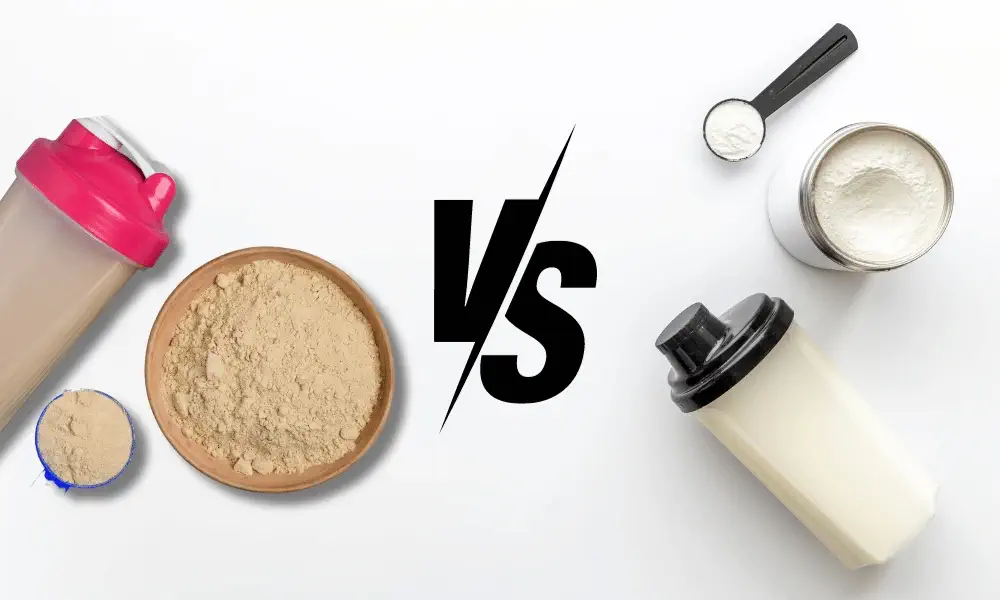
15 Sep Meal Replacement vs Whey Protein Difference | How to Choose?
If you are into fitness or bodybuilding, then you might want to know the differences between meal replacement vs whey protein.
This is because, in the bustling world of nutritional supplementation, the fitness world inevitably relies on additives to fulfill their needs for ideal physiques.
Health-conscious freaks usually strive to forge their ideal physiques and cultivate their inner vitality by adding top-notch supplementations.
Meal Replacement and Whey Protein are two such stalwart contenders that are stepping into the spotlight.
Both individually bear their unique arsenal of nutrients, these contenders transcend mere sustenance to become pillars of dietary facts.
The first panel comprises the precision-focused whey protein non for its progress in feeling muscle growth and recovery.
In the other corner, the versatile and multifaceted meal replacement shakes image a culinary chameleon ready to impress the essence of a complete meal.
As we venture into the realm of nutritional decision-making, to guide you to be prepared to witness the clash of titans.
Delve into the discussion to gather facts about where energy is harnessed, goals are sculpted, and nourishment takes on diverse forms.
If you are an aspiring enthusiast, this analysis of Meal replacement vs whey protein is the perfect pursuit of well-being and helps you to know its intriguing benefits.
What is a Meal Replacement Shake?

Meal Replacement Shake is a supplement of convenience and comprehensive nutritional uptake that emerges from the energy of a complete meal.
Undoubtedly, it’s a formidable contender in the world of dietary innovation as it is crafted with a full set of nutrients.
Fitness freaks combine Meal replacement shakes in their diet because they offer a meticulously curated blend of macronutrients and micronutrients.
This eventually mirrors the complexity of a complete meal in just one scoop. Notably, these shakes often incorporate dietary fiber, along with nutritional acumen, protein, carbohydrates, healthy fats, fiber, vitamins, and minerals.
Surely, it’s the perfect approach to cut off a complete meal by incorporating meal replacement shakes into the dietary regime.
What is Whey Protein?

Nestled at the pinnacle of nutritional innovation, whey protein stands as evidence of the symbiotic relationship between science and wellness.
Whey protein is an incredible by-product of cheese production’s emergence as a protein powerhouse. It boasts a complex web of amino acids trailed to nourish and rejuvenate the human body.
The extraction involves a delicate process of separation and purification of the by-products of cheese production. This process carries up in a pristine powder that embodies the essence of muscle recovery and growth.
Apart from its biological blueprint, whey protein carries an exceptional bioavailability rendering its amino acid profile for optimizing fitness endeavors.
Further, the nutritious powder boasts up the source of protein needs bestowing patterns to deliver an unanticipated field of vitality.
This is why professional bodybuilding trainers use whey to complete their bodybuilder protein intake. Let’s compare whey protein vs meal replacement to get a bit of analysis that both supplement and their individual goals.
Meal Replacement vs Whey Protein – 10 Differences

Meal replacement shakes and whey protein are distinct nutritional allies with significant roles in health consistent lifestyle. Here are some of the critical factors you need to know to differentiate these both as for your preference.
#1. Nutrient Composition (Carbs and Protein)
Comparing whey protein vs meal replacement based on nutritional makeup is pretty easy as they vary greatly, especially in the ratio of carbohydrates to protein.
Meal Replacement: Meal replacement shakes emphasize a well-balanced blend of macronutrients to mimic a full meal.
Carbohydrates in meal replacement shake provide sustained energy by incorporating complex carbs, dietary fiber, and sometimes sugars to maintain stable blood sugar levels throughout the day.
Although protein content is a bit low in these shakes.
Whey Protein: On the other hand, whey protein focuses particularly on offering a large amount of protein. It is made from whey, the liquid leftover from making cheese, and is processed to concentrate or isolate the protein component.
Whey protein powders are hence extraordinarily high in protein concentration and may have little to no carbohydrate content.
#2. Purpose
Meal Replacement Shakes or Whey Protein serves distinct purposes in the realm of nutrition and fitness.
Meal Replacement: The primary purpose of meal replacement is to offer a convenient and balanced substitute for a complete meal.
With substituting a well-rounded meal it promises to keep you satiated for a longer period of hours and makes you full.
Furthermore, people also use meal replacement shakes for weight loss because they heighten the nutritional uptake.
Whey Protein: Whey protein, on the other hand, exerts nutritional supplements aimed at fulfilling protein requirements.
Further, it also provides a high-quality source of protein that aids in muscle recovery, growth, and repair.
#3. Macronutrient Ratios
Keeping a count of what macronutrients you are taking with the source of food is also vital.
Meal Replacement: Meal substitutes typically consist of a moderate to equal distribution of protein, carbohydrates, and fats.
It promises a balanced macronutrient ratio that helps stabilize blood sugar levels, sustain energy, and provide a feeling of fullness. Along with fulfilling ample macronutrients and micronutrients
Whey Protein: It delivers a concentrated protein boost, making it an effective choice for individuals seeking to increase their protein intake without significantly affecting their overall calorie or carbohydrate consumption.
#4. Caloric Content
The ideal whey protein offers a lower-calorie alternative that prioritizes protein intake for muscle support and recovery, meal replacement shakes offer a higher caloric content because of their more complete nutritional profile.
Meal Replacement: The nutrient composition of meal replacement powder
is intended to closely mirror that of a whole meal.
As a result, they typically contain more calories. Depending on the brand and formulation, a typical meal replacement shake may include 200 to 400 calories or more.
Whey Protein: Whey protein, in contrast, primarily combines fewer calories and focuses on delivering protein with minimal carbs and fats.
Depending on the type and flavor, a normal serving of whey protein powder typically has between 50 and 100 calories.
People who believe a high protein diet and weight loss are linked can use whey to increase their daily protein intake while taking care of their calorie deficit.
#5. Convenience
We can also do meal replacement vs whey protein based on convenience and why you should prefer one.
Meal Replacement: Meal replacement shakes are well-known for their efficiency, providing a prompt and thorough response to hectic schedules.
Because of this, meal replacement shakes are a hassle-free choice for people who are always on the go or don’t have time for regular meals.
Whey Protein: Whey protein is convenient for consuming protein quickly, especially after exercise. Your decision between the two should be based on whether you require comprehensive nutrition or a particular protein boost.
#6. Affordability
Keeping your pocket in check is also needed to chase the fitness goal. It might be a slight in the affordability of meal replacement and whey protein.
Meal Replacement: Since meal replacements are effectively considered by specific groups of individuals with particular needs, they can be a bit expensive.
However, there is a perk of ingesting these shakes as they naturally meet the body’s daily nutritional needs at a bare minimum amount.
Whey Protein: Whey protein supplements are generally more affordable when compared to meal replacement shakes. They have a targeted approach to balancing up protein extent in the body.
This targeted approach allows for a more cost-effective option for individuals aiming to increase their protein intake without the bells and whistles of a meal replacement shake.
#7. Digestion Issues
Since the dietary addition is for the betterment of health, it’s vital to know whether they are well digestive to health or not.
Meal Replacement: Packed full of nutrients in one serving may be sometimes intolerant for people with weak digestive systems.
Most meal replacement shakes however combine easy-to-digest digestive enzymes in their formulation to eliminate one of the most common problems of people on a weight loss journey.
Whey Protein: Being an extracted form of dairy products it is kind of indigestible for a group of individuals.
Those who are lactose intolerant or sensitive to dairy products might experience bloating, gas, or another discomfort after consuming whey protein.
#8. Vegan-Friendly
A lot of Vegan users usually can’t get most of the supplements available out there because of indulgence in animal or dairy products.
Meal Replacement: With meal replacement shake your concern can be eliminated as most brands offer male replacement powder without adding any animal or dairy products.
So, for them, the dietary approach is surely the best substitute or additive to fulfill their nutritional needs in just one scoop.
Whey Protein: Technically, Whey protein is the by-product of cheese so it certainly is not dairy-free.
This eventually confirms that the source of protein is not a favorable choice for vegan individuals. it is not a vegan-friendly component.
#9. Balanced Energy
Whether you are gulping meal replacement for weight loss or whey protein for muscle growth boosted energy is also one of the prior needs.
Meal Replacement: Meal replacement shakes are an excellent choice for people looking for steady and long-lasting energy because of their balanced energy profile, which may keep you feeling satisfied and energized throughout the day.
They provide a steady flow of energy with a combination of protein, carbs, and healthy fats, assisting in preventing sudden spikes and dips in blood sugar levels.
Whey Protein: The amino acids in whey protein may give you a rapid energy boost, but it doesn’t provide the whole range of nutrients you need for sustained and balanced energy levels.
Because of is a primarily protein supplement, it doesn’t provide the same level of balanced energy as meal replacement shakes.
#10. Meal Diversity
Being on a specific diet plan individuals always look for healthy alternatives and diversity in their choices of meal.
Meal Replacement: Meal replacement shakes offer a wider range of meal diversity due to their comprehensive nutrient profile.
It can be one of the sources you can rely on for a sweet, soothing, and filling meal. The market is filled with highly nutritious meal replacement shakes.
PhenQ Meal Shake is one such product that is packed with 13 vegan minerals and vitamins along with whey protein.
Whey Protein: This, on the other hand, is alternatively used to support training and consequences related to it.
Whey protein is better suited as a supplement to augment existing meals rather than providing a comprehensive meal replacement solution.
After getting a detailed comparison of Whey protein vs Meal replacement shake, let’s find out how it helps in different aspect of fitness.
Meal Replacement vs Whey Protein Muscle Gain
As mentioned above, meal replacement shakes are crafted to provide a balanced mix of macronutrients and micronutrients to mimic a full meal.
On the other hand, Whey Protein is a concentrated source of protein that plays a key role in muscle recovery and growth.
So, yeah, the clear winner between whey protein shake vs meal replacement for muscle gain is the protein here.
They are rich in essential amino acids, particularly Branched-Chain Amino Acids (BCAAs), which play a crucial role in muscle protein synthesis.
>> Also check out Beginner Mass Gainer for other high-protein sources for muscle gain.
Meal Replacement Shakes vs Whey Protein for Weight Loss

Between whey protein vs meal replacement for weight loss, there is no clear “winner”. Depending on your personal preferences and needs, both can be beneficial.
A set of groups may appreciate the ease and protein-focused aspect of whey protein supplements. On the other hand, others might find meal replacements to be more gratifying and handy.
Along with combining any of them, following up a healthy diet plan with an active workout team will lead to Healthy weight loss.
Since people use meal replacement as a complete substitute for high-calorie meals, it can be a decent approach to pursue a healthy weight loss journey.
Whether you choose whey, meal shakes, or whey protein as meal replacement for weight loss, the significant result only gets delivered by combining these products with an active diet plan.
Whey Protein vs Meal Replacement for Fat Loss
When it comes to fat loss, considering the best Meal replacement or whey protein is also challenging.
A restricted diet plan with balanced calorie intake is the foremost demand of a successful fat loss journey. Meal replacement may work on this aspect.
But for forcing the body to use accumulated fat as a source of energy whey protein plays a significant role. During the process of fat loss protein specifically tells your body to use stored fat as a source of energy and convert the fat into muscle mass.
So, don’t get confused between Meal replacement vs whey protein for fat loss. Choose a good quality whey protein to lose those love handles while building muscles at the same time.
But before you start scooping into your shaker bottle, ensure that you are taking the right amount of whey protein for weight loss. Furthermore, Some fitness freaks also ask whether they combine both in their diet plan or not.
Can I Use Meal Replacement and Whey Protein Together?
Absolutely yes! Depending on your unique goals and dietary requirements, you can use meal replacement shakes and whey protein together as part of your nutritional approach.
Some of the possible benefits you might get by indulging both altogether:
- Post-Workout Boost
- Customized Nutrition
- Balanced Snacks
- Less Caloric
- Enhanced Protein Intake
Since the main difference between Meal replacement and Whey protein is their aspect of supporting fitness gains, you can combine them.
Well, it’s vital to keep in mind that moderation is compulsory. Combining health supplements altogether could cause your diet as a whole to become unbalanced.
Even though they support your goal, speak with a healthcare provider or qualified dietitian. Maybe an overdose of these supplements can negatively impact too.
Some individuals also look for a significant way to decide how to choose the best among them.
How to Choose?
When choosing a meal replacement vs whey protein, consider factors such as your specific dietary goals, nutritional needs, and preferences.
So if you are wondering how to select whey protein that is best for you, there are some important factors you need to consider.
To prefer the best protein substitute, prioritize premium alternatives that offer enough protein per serving to support your fitness objectives.
In addition to this, consider your dietary preferences and choose goods with few additives and fillers, such as whey isolate (lower in lactose) or concentrate.
Just like Whey Protein, while choosing a Meal replacement shake you should also look for options that are low in added sugars and contain dietary fiber to support satiety and digestion.
We recommend you opt for a product with a balanced macronutrient profile including protein, carbohydrates, and healthy fats, as well as a range of vitamins and minerals for overall health.
Well, to avoid the side effects of meal replacement shakes don’t completely rely on that and eliminate all of your meals. Instead, combine them with the complete meal and replace just one meal in the initial days.
FAQs
Here are some of the related queries users also ask regarding meal replacement and Whey protein. Go through these questions carefully to clear your remaining doubts about this two health supplements.
1. Is Whey Protein Good for a Meal Replacement?
Not actually, Whey protein is not a good option for a meal replacement because it does not contain any additional nutrients and carbs.
2. Is it Better to Have a Meal Replacement or a Whey Protein Shake After a Workout?
Well, considering both together is good but consuming a meal workout before a workout and a whey protein shake after a workout help you get better outcomes.
3. Can You Use Whey Protein as a Meal Replacement to Lose Weight?
You can use whey protein as a meal replacement if you add additional calories to your protein shake and make it a healthy breakfast smoothie.
4. Does Meal Replacement Help Build Muscle?
It may support muscle growth due to having a complete source of nutrients in one serving, but there is more research that needs to be done.
5. Does Whey Protein Burn Belly Fat?
The consumption of whey protein alone will not magically reduce abdominal fat. However, adding whey protein to a healthy diet and exercise routine can help with general weight loss and fat loss, which includes loss of belly fat.
6. Is it OK to Replace 2 Meals With Protein Shakes?
No, absolutely not. Protein shakes are just an additional source to balance up daily protein intake. They don’t provide other nutritional support that’s why replacing 2 meals with protein shakes is not recommended.
Final Call
In the world of nutritional choices, the comparison between meal replacement vs whey protein unfolds as a pivotal consideration.
Meal replacement shakes emerge as a versatile companion, offering a comprehensive blend of nutrients. These easy-to-make shakes help the user to cut down calories by making them feel fuller for longer.
Whereas, whey protein, specializes in delivering targeted protein intake essential for muscle growth and recovery, particularly after exercise.
It is pretty affordable and also boosts energy by forcing the body to burn accumulated fat. Considering them as per preference can be worthwhile.



No Comments